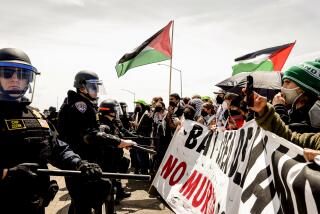U.S. Won’t Prosecute Police for Use of Force at Abortion Rallies
- Share via
WASHINGTON — The Justice Department said Wednesday that it has decided not to prosecute local police officers on charges of using excessive force when they arrested anti-abortion demonstrators in four cities, including San Diego, two years ago.
Justice Department prosecutors who reviewed the allegations concluded they lacked evidence of criminal intent by the officers to use excessive force when they arrested protesters who were blocking the entrances to abortion clinics, spokeswoman Amy Casner said.
The allegations stem from a series of 1989 demonstrations organized by the anti-abortion group Operation Rescue in Los Angeles, San Diego, Pittsburgh and West Hartford, Conn.
Anti-abortion activists charged that police used illegally brutal tactics by applying chokeholds, armlocks and other “pain-compliance” techniques to make arrests.
Videotapes of some of the arrests were played at a 1989 hearing of the U.S. Commission on Civil Rights.
One of the most serious incidents occurred in Los Angeles, where a protester’s arm was broken when officers twisted it with a nunchukus, an Asian martial arts weapon that consists of two clubs connected by a chain or a leather strap.
Some police officials testified that officers were justified in using force because demonstrators had resisted arrest by refusing to move.
Casner said investigators lacked evidence that the police intended to use excessive force, the standard or proof that must be met in order to obtain a conviction under federal civil rights laws.
If such evidence were produced, the Justice Department would look at the allegations again, she said.
Allegations of police misconduct in several other cities are still being reviewed by the Justice Department’s civil rights division, she said.
Patrick Riley, government affairs director of the Catholic League for Religious and Civil Rights, charged that the FBI failed to conduct a thorough investigation of the allegations.
Riley and attorney Rosanna Weissert said the FBI interviewed none of the 60 women who were arrested following a March 9, 1989, protest in Pittsburgh.
More to Read
Sign up for Essential California
The most important California stories and recommendations in your inbox every morning.
You may occasionally receive promotional content from the Los Angeles Times.










